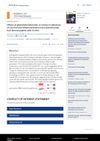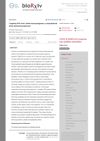Search
for
Sort by
Research
30-60 / 1000+ resultsresearch Metabolism and Action of Androgen in the Skin
Androgens affect skin conditions like acne and hair loss through specific biochemical pathways.
research Hormone-Dependent Medial Preoptic, Lumbar Spinal Cord, and Autonomic Coordination Supporting Male Sexual Behaviors
Testosterone and its byproducts help support male sexual behavior through different pathways in the brain and body.

research Effects of Oleanolic Acid on Hair Growth in Mouse Dorsal Skin Mediated via Regulation of Inflammatory Cytokines
Oleanolic acid improved hair growth in mice by affecting hair growth pathways and reducing inflammation.

research The Mechanism of Activated Platelet-Rich Plasma Supernatant Promotion of Hair Growth by Cultured Dermal Papilla Cells
Activated platelet-rich plasma helps hair growth by boosting growth factors and cell growth pathways in hair cells.

research Effects of Photobiomodulation at Various Irradiances on Normal and Dihydrotestosterone-Treated Human Hair Dermal Papilla Cells In Vitro
Red light at 8 mW/cm2 most effectively promotes hair cell growth and affects key growth pathways, especially in cells treated with a hair loss-related hormone.

research Ginseng in Hair Growth and Viability
Ginseng, especially its component ginsenosides, can promote hair growth, reduce hair loss, and potentially treat conditions like alopecia by affecting cell pathways and cytokines.

research Integrated miRNA and mRNA Analysis Provides New Insight into Mechanism of Dermal Papilla in Androgenetic Alopecia
Increased cell death and reduced cell growth in hair follicles contribute to baldness.

research Bad Hair Day: Testosterone and Wnt Signaling
Testosterone can both promote hair growth and cause baldness by affecting hair growth signals.
research Unlocking the Power of Light on the Skin: A Comprehensive Review on Photobiomodulation
Light-based treatment, Photobiomodulation, shows promise for non-invasive skin therapy with few side effects.

research Self-Organizing and Stochastic Behaviors During the Regeneration of Hair Stem Cells
Hair stem cell regeneration is controlled by signals that can explain different hair growth patterns and baldness.

research The Role of Linoleic Acid in Skin and Hair Health: A Review
Linoleic acid is important for healthy skin and hair.

research Hair-Growth Potential of Ginseng and Its Major Metabolites: A Review on Its Molecular Mechanisms
Ginseng and its compounds may help hair growth and prevent hair loss, but more human trials are needed to confirm this.

research Role of Insulin Resistance and Diet in Acne
Eating high glycemic foods and drinking milk may worsen acne by increasing insulin and IGF-1 levels.

research Genome-Wide Expression Profile Analysis of 3D Cultured Dermal Papilla Cells from Patients with Androgenic Alopecia
Hair loss in androgenic alopecia patients is linked to changes in certain genes that control cell growth and death.

research Apoptosis in Hair and Skin: A Review
The study concludes that regulating apoptosis could lead to new treatments for various skin and hair conditions.

research Metabolism and Skin Diseases
Skin health and diseases are closely linked to metabolic processes.

research Recent Advances in Drug Design and Drug Discovery for Androgen-Dependent Diseases
New treatments for prostate cancer and BPH show promise, including novel compounds that target hormone synthesis and response.

research COVID-19 and Sex Differences: Mechanisms and Biomarkers
Men are more likely to have severe COVID-19 cases and fatalities than women due to factors like lifestyle, aging, and biological differences.

research Targeting PrfA From Listeria Monocytogenes: A Computational Drug Repurposing Approach
The research suggests Dutasteride and Solifenacin may be effective against the bacterium causing listeriosis.

research Personalized Medicine in the Field of Inflammatory Skin Disorders
Personalized medicine is important for treating skin disorders, with new treatments and connections to hormones and genetics being explored.
research Investigation of Hub Genes and Immune Infiltration in Androgenetic Alopecia Using Bioinformatics Analysis
Immune activities and specific genes are important in male pattern baldness.

research Metabolic Syndrome and the Skin: A More Than Superficial Association
Some skin conditions may indicate metabolic syndrome, which could help with early detection and management of related health issues.

research What Is the Male Polycystic Ovary Syndrome Phenotype?
Men can have genetic risks for PCOS-related traits like obesity and diabetes.

research Therapeutic Potential of Stem Cells in Follicle Regeneration
Stem cells, especially from fat tissue and Wharton's jelly, can potentially regenerate hair follicles and treat hair loss, but more research is needed to perfect the treatment.
research LncRNA RP11-818024.3 Promotes Hair-Follicle Recovery Via FGF2-PI3K/Akt Signal Pathway
LncRNA RP11-818024.3 helps hair growth and recovery in hair loss by boosting cell survival and reducing cell death.

research A Genetically Defined Male Counterpart of Polycystic Ovary Syndrome: Evidence for Ovarian-Independent Pathogenesis
Men with high genetic risk for Polycystic Ovary Syndrome (PCOS) have increased chances of obesity, type 2 diabetes, heart disease, and hair loss, showing PCOS risk factors can affect both genders.

research Preparation of 3H-Labelled Testosterone Metabolites
The conclusion is that tritium-labeled testosterone metabolites can be made and are better converted into dihydrotestosterone in skin cells than in prostate tissue.

research Anti-Aging Medicine for Hair
Early anti-aging hair treatments should focus on anti-inflammatory agents and promoting healthy hair growth cycles.

research Rooster Feathering, Androgenic Alopecia, And Hormone-Dependent Tumor Growth: What Is In Common?
Sex hormones affect hair and feather growth and may help manage alopecia and hormone-dependent cancers.